
July 22, 2015 - A study has found no increase in overall survival but a reduction in breast cancer recurrence when the lymph nodes receive additional radiation beyond the standard treatment of whole-breast irradiation after breast-conserving surgery.
The research, which examined the addition of regional nodal irradiation to whole-breast irradiation compared with whole-breast irradiation alone, was published in the New England Journal of Medicine. It was led by Tim Whelan, M.D., professor of oncology with McMaster University's Michael G. DeGroote School of Medicine and a radiation oncologist at Hamilton Health Sciences Juravinski Cancer Centre.
The study involved women with axillary node-positive (cancer in the lymph glands under the arm) or high-risk node-negative breast cancer (no cancer in under-arm nodes, but cancer with bad prognostic features).
Radiotherapy to the chest wall and regional lymph nodes (under the arm, above the collar bone and under the breast bone), known as regional nodal irradiation, is used after mastectomy in women with node-positive breast cancer who are treated with adjuvant systemic therapy. Such treatment reduces breast cancer recurrence and improves survival.
Currently, most women with breast cancer are treated with breast-conserving surgery followed by radiation to the whole breast. An important unanswered question was whether the addition of regional nodal irradiation to the usual radiation of the breast would improve outcomes.
"This study is important because it shows that additional radiation to the surrounding lymph nodes provides added benefit to women, particularly those with involvement of the lymph nodes in the axilla," said Whelan.
"Additional radiation to the surrounding lymph nodes reduced the risk of subsequent recurrence of breast cancer both locally, such as under the arm, and at sites distant from the breast, such as the bone, liver and lung. The treatment did not increase survival, but follow-up is still relatively early."
The nodal treatment was associated with limited toxicity, including a slight increase in the risk of radiation pneumonitis and lymphedema (fluid retention and swelling) of the arm.
The study, conducted over 14 years by the NCIC Clinical Trials Group at Queen's University in Kingston, Ontario, involved more than 1,800 patients and a team of investigators from Canada, the United States and Australia.
"Further research is necessary to determine which women are most likely to benefit and who may avoid the additional radiation," said Whelan, adding that it is exciting that another study performed in Europe has showed very similar findings.
For more information: www.fhs.mcmaster.ca


 February 18, 2026
February 18, 2026 









